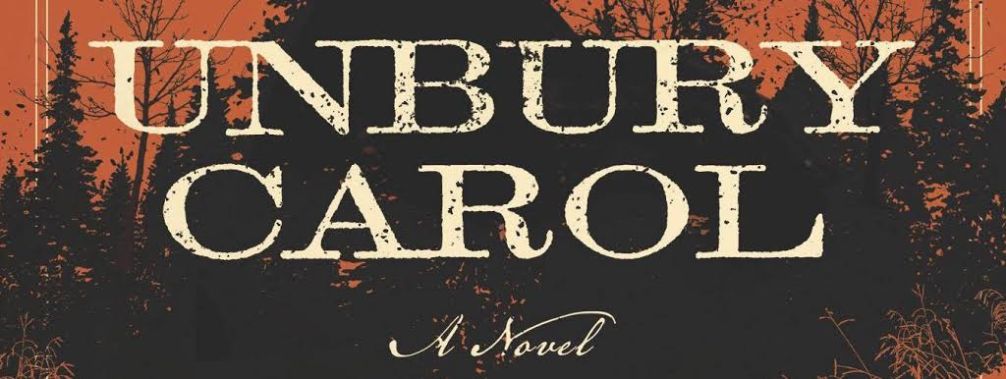Unbury Carol
Josh Malerman
Del Rey
April 2018
Reviewed by Gordon B. White
Josh Malerman’s Unbury Carol is a Western tinged with elements of the supernatural, the Gothic, and more than a hint of fairy tale, and which charts new ground for the author. A loping Trail-duster of a tale, Unbury Carol has an enjoyable ride to offer readers looking for something weird in their Westerns.
As befits a novel about traveling the Trail, in Unbury Carol the journey is the real destination. When Carol Evers falls into one of her recurrent death-like comas and a dastardly plot to entomb her alive is set into motion, retired outlaw James Moxie – Carol’s former flame – sets out from his home in Miskatoon at the far end of the Trail and heads towards Carol’s waiting grave in Harrows. While Moxie is pursued along the legend-haunted Trail by his own bloody past and a deranged triggerman with tin legs, Carol wrestles against supernatural forces and the paralytic state that she calls Howltown to bring herself back to the land of the living. Of course, Unbury Carol wouldn’t be a Western worth its boots if there wasn’t a cast of colorful outlaws after Moxie and it wouldn’t be weird if there wasn’t a tinge of horror surrounding Carol.
While the present day struggles and slow revelation of their entwined past pulls the plot along, the real joy of the novel comes from the strange little towns and townspeople that serve as outposts along both the Trail and the tale itself. A host of charming characters and gruesome grotesques people the path from one end to the other and the scenes and asides they populate give Unbury Carol a particularly wild and woolly feel. From Smoke, the menacing hitman with the tin legs, and the diligent Sheriff Opal to a literally card-carrying overseer whose shuffled deck tracks the Trail’s ne’er-do-wells, one of Moxie’s fawning fans, and a stooped old outlaw turned bibliophile, Unbury Carol’s world feels lived in and each digression adds its own little spark. Every step along the way and each peek into a new house and a new head offer something new.
The world of the Trail itself too is a particular accomplishment. Although there is a very real threat in the supernatural being named Rot that assails both Carol and Moxie, the rest of the world operates along a hazy boundary between tall tales and actual magic. It is a place where those overtly supernatural manifestations can co-exist alongside feats of old fashioned legerdemain and still have comfortable room for the ambiguity of a did-he-didn’t-he magical gunfight that once cemented Moxie’s reputation as the King of Bullets. The towns along the Trail are a setting that provides fertile room for the readers’ imaginations and could easily be revisited should Malerman ever want to make a return trip.
While other reviews draw comparisons to fairy tales (particularly Sleeping Beauty, though one in which Beauty fights to save herself), there is also a Gothic tone lurking beneath the surface. The threat of live burial feels more like the Edgar Allen Poe of Premature Burial, Berenice, and other tales than it does the Brothers Grimm. Indeed, in Carol’s husband Dwight readers might find a Montressor, rendered in suitably petty colors by placing him squarely as an antagonist. The battle, too, of the supernatural embodiment of Rot (rather than mere death) against Moxie and Carol feels like less of the absolute white/black morality of fables or inscrutable cause/effect older tales than it does as an idea explored in its deeper gradations of decay. It’s a credit to Unbury Carol and to Malerman that so many interesting ideas can swirl around the pool while it still remains its own thing.
Like any outlaw-cum-hero, some of Unbury Carol’s defining characteristics might be strengths to some readers while at the same time burrs beneath other readers’ saddles. Drawing water from so many different wells virtually guarantees that no matter what kind of book you expect Unbury Carol to be, it’s something different. For example, its horror adds wonderful color but is never truly terrifying, while its historical elements are more dreams of the West than hobnail-hard facts. Similarly, the time spent exploring the broad world may sometimes feel at odds with the ticking clock that the narrative sets, and by eschewing a typical tight third-person POV for more of a head-hopping omniscient narrator reminiscent of 19th century novels, any particular reader’s enjoyment may shift depending on which point in the Trail they find themselves at.
Unbury Carol is an exciting delivery from Josh Malerman. Proving that he is an author who is never content to run the same trails, the novel delivers readers a thoroughly unique journey into a strange land. While every leg may not be for every rider, we should all be waiting to see what Malerman does next.










Thanks for this insightful review, Gordon. I reviewed Josh’s UNBURY CAROL for NYC’s LIBRARY JOURNAL, and couldn’t agree more.
EXTRACT: “VERDICT: Admirers of the bleakly lyrical à la Cormac McCarthy and Flannery O’Connor’s gothic grotesque will find this appealing. [See Prepub Alert, 10/22/17.]—WILLIAM GRABOWSKI, MCMECHEN, WV”